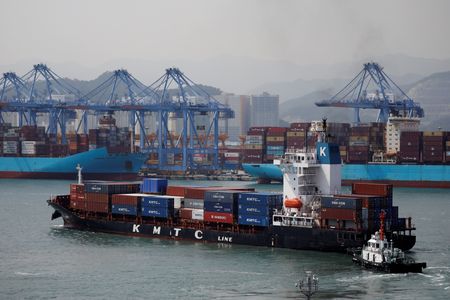
By Jamie McGeever
(Reuters) – A look at the day ahead in Asian markets from Jamie McGeever.
As world markets tread water ahead of U.S. mega-tech earnings and the Bank of Japan meeting this week, investors on Tuesday will have one eye on the first estimate of South Korean GDP growth in the first quarter and another on the latest twists in key Asian currencies.
The declining value of the yuan, particularly against the euro, continues to cast doubts over China’s post-Covid recovery, while Hong Kong’s central bank is battling increasing pressure on its financial system and exchange rate.
The consensus view in a Reuters poll of economists is that South Korea’s economy grew 0.2% in the first quarter after shrinking 0.4% in the final quarter of last year, narrowly escaping recession and underscoring the challenge for policymakers trying to shore up growth.
On a year-on-year basis, GDP likely grew 0.9% in the first quarter, the poll showed, down from 1.3% in the fourth quarter of last year.
One of the biggest drags on growth could be trade. Exports to China, the country’s largest trading partner, plunged 33.4%.
On the face of it, however, China’s economic rebound since its post-pandemic reopening looks strong. Economic surprises are the most positive in 17 years, and a host of investment banks have bullish calls on Chinese growth and assets.
But Chinese geopolitical risk – Taiwan, U.S. relations, cyber warfare, spy balloons, Beijing’s close ties with Moscow – is large and growing.
China on Monday may have said it respects the status of former Soviet member states as sovereign nations, but the unease across Europe sparked by comments to the contrary by China’s envoy to Paris will not dissipate quickly.
Graphic: Euro/yuan – spot rate – https://fingfx.thomsonreuters.com/gfx/mkt/gdvzqbwakpw/EURCNY.png
China’s yuan on Monday fell to a 19-month low against the euro through 7.60/euro. It is down five straight weeks against the euro, the longest losing streak since 2018, and while the euro is on a tear globally, perhaps politics are figuring more prominently in investors’ thinking.
The Hong Kong Monetary Authority, meanwhile, is draining money market liquidity to intervene in the FX market and support its currency.
The HKMA waded into the currency market last Wednesday and bought HK$6.9 billion ($881 million) to prevent the HK dollar from breaking through the weak end of its trading band at 7.85 per U.S. dollar.
In doing so though, the HKMA’s aggregate balance has slumped to below HK$50 billion, the lowest level since 2008. Banks’ aggregate cash balance at the HKMA, a key measure of cash in the banking system, was more than HK$300 billion as recently as June and more than HK$450 billion less than two years ago.
Tuesday will be a quiet day in Australia and New Zealand markets – they will be closed for the Anzac Day holiday.
Graphic: Hong Kong banks’ aggregate cash balance lowest since 2008 – https://fingfx.thomsonreuters.com/gfx/mkt/jnvwybwrlvw/HKMA.jpg
Here are three key developments that could provide more direction to markets on Tuesday:
– South Korea GDP (Q1)
– Japan services PPI (March)
– Hong Kong trade (March)
(By Jamie McGeever; Editing by Josie Kao)

